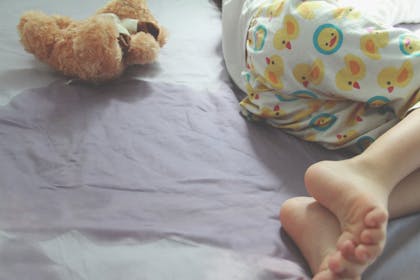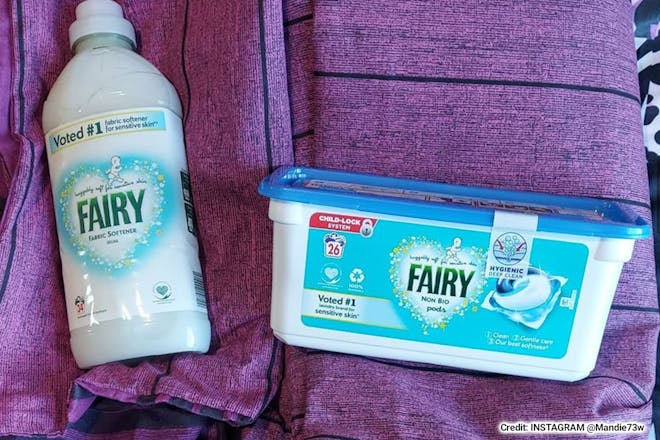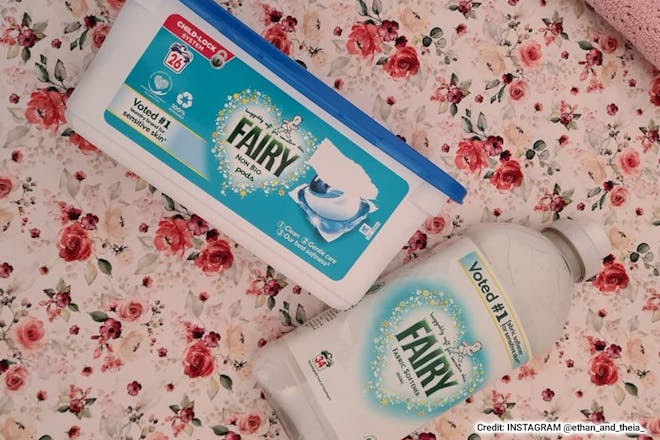Bedwetting in school-age children
Advertisement Promotion
Every parent expects accidents while their child is toilet or potty training. But what happens when your child is still wetting the bed – or suddenly starts – once they're in school? From trying alarms to medication, here's what can help stop bedwetting in school-age children.
How common is bedwetting in school children?
Half a million children and teenagers in the UK regularly wet the bed according to research from ERIC, The Children's Bowel & Bladder Charity .
Of these, it's estimated that around 12% are aged between seven and nine, so at primary school.
Some children may have never been dry at night – this kind of bedwetting is referred to as (primary) nocturnal enuresis.
Others begin wetting the bed at night after a long period of being dry. This is called secondary enuresis.
Both types need to be treated in the same way (see below).
How to wash your child’s bedding
Regular bed wetting can be upsetting for your child, and it can also be stressful for you with endless washing of sheets and pyjamas.
There are steps you can take to lighten the load, including putting an absorbent mat on your child's mattress before popping a sheet on. This will soak up any urine and stop it sinking into the mattress.
Try our simple tips for how to wash your child’s bedding and pyjamas if they are wet at night, along with advice on how often you should change bedding.
Pick a gentle detergent and a snuggly, soft fabric softener … you want to get everything clean but also leave your child’s sheets and PJs also soft against their skin. Choose a non bio detergent like Fairy Non Bio Sensitive Skin Dream Team : Fairy Non Bio PODS® and Fairy Fabric Softener . The Pods contain gentle ingredients and mild perfume to shift dirt and stains and any urine smells.
Start washing … pop a Fairy Non Bio POD into your washing machine before loading the bedding on top. There’s no need to measure out any liquids or powders; the Pods will do the hard work and wash away any urine from your child’s sheets. Pour in some Fairy Fabric Conditioner for extra huggable softness.
Turn up the temperature … urine can leave behind bacteria on clothes and bedding. If your child has wet the bed, wash their sheets and PJs at 60 degrees. (Always check the care labels first though.)
Go outside ... if it’s a sunny day, hang the bedding to dry outside. Not only is it the most environmentally-friendly way to dry your clothes, the sun will also bleach away any stains.
Why do some children wet the bed?
The causes of bedwetting are not fully understood but what is known that it's not due to laziness or a lack of willpower.
According to ERIC, there are three main reasons for wetting the bed:
1
Not waking up in the night
Your child might simply not wake up the signal that their bladder is full and needs to be emptied.
2
Your child produces too much urine at night
The hormone vasopressin is released during sleep and reduces the amount of urine produced through the night. If your child has low levels of this hormone, their body will produce to much urine at night for their bladder to hold.
Signs include wetting soon after sleep, large amounts of urine and weak urine concentration in the mornings.
3 The bladder can't stretch enough
If the bladder is restricted then it won't have enough space to stretch and fill with urine – and may empty earlier (ie in the night) than if there were more room.
This can happen if your child is constipated: if the bowel is full of poo, it can press into the bladder and limit space for urine to sit until it's emptied.
An overactive bladder can also affect the bladder's ability to hold urine until the morning. The bladder muscle contracts before the bladder is full in this instance, causing nighttime bedwetting.
Other reasons for bedwetting at night can include:
- Genetics – research shows that wetting the bed if one parent wet the bed, their child has a 40% chance of doing the same; if both parents wet the bed, there’s a 70% chance.
- Underlying health conditions such as type 1 diabetes or a urinary tract infection.
How can you help your child stop bedwetting?
Whether something like starting school has suddenly triggered bedwetting, or if it's something they've always done since toilet training, the solutions are the same for both.
Start by following these simple tips:
Stop drinks an hour before bedtime ... Don’t give your child anything to drink in the hour before bedtime and make sure they have a wee before going to sleep.
Be mindful of drink choices ... Avoid giving your child caffeine, including fizzy drinks or hot chocolate. This is because caffeine increases your body’s urge to wee.
Make it easy to get to the loo at night ... Think about how your child will get to the loo at night and make sure it’s as easy for them as possible.
You might want to leave a night light on in their room so they can see where they are going. Also, leave a child seat on the toilet ready for them with the lid up.
Give your child enough to drink in the day ... Cutting back on the amount of fluid your child has in the day won’t stop them bedwetting. In fact, it could cause constipation that can cause bedwetting.
Make sure your child has regular fluids – 6-8 glasses a day – but avoid drinks that seem to make the problem worse, for example, fizzy drinks.
Don’t tell your child off ... Remember that your child isn’t being lazy. Don’t tell them off but instead reassure them that their bedwetting will stop.
Can starting school cause bedwetting at night?
ERIC says that anxieties or stresses that can suddenly trigger bedwetting at night can include:
- starting school
- exams
- illness
- moving house
- a new baby
- any other big life changes.
When a child who has been previously dry for at least six months starts wetting again it’s known as ‘secondary nocturnal enuresis’, explains Alina Lynden, Helpline Advisor for ERIC:
'This type of wetting can be due to emotional/psychological reasons (such as a period of change or stress in a child’s life and bullying) so, starting school can definitely be a possible trigger for this type of sudden onset bedwetting,' she says.
There's no need to be alarmed if your child suddenly seems to regress and starts bedwetting at night again, having been dry for some time.
'It could be that your child is avoiding going to the toilet at school for some reason – this can lead to constipation and bladder problems such as urinary tract infections and over stretching of a child’s bladder muscles, common causes of bedwetting.
'Lots of children also forget to drink during the school day (or even avoid drinking so they don’t need to use the toilet) and this can also be a factor as it affects how much their bladder can hold,' she says.
'Starting school can also be a stressful and tiring time in a child’s life as they get used to a new routine. When children get overtired it can make it harder for them to wake to their full bladder signal,' she says.
Although it's likely that this bedwetting will settle down as they grow used to life at school, it’s still important to get checked out by a health professional such as your GP or school nurse.
'This way, any underlying physical causes including constipation and UTIs are all ruled out,' says Alina.
How do bedwetting alarms work?
Experts say that using a bedwetting alarm reduces bedwetting in about two thirds of children during treatment, and about half the children remain dry after stopping using the alarm.
So, if none of the steps work, it might be worth trying one.
Bedwetting alarms are recommended for seven-year-olds, or slightly younger children who can understand the concept of what it is.
They come in a variety of designs (and prices) but usually have a sensor worn in the pyjamas or pants. This sets off an alarm if they get wet.
The idea is to wake up your child once they start to wee, so they don't fully wet the bed and can get to the toilet to finish it off.
It's recommended that you use it every night for three to five months, to get results. It can be a bit startling at first to hear a sound in the night or your child may find it uncomfortable at first, but try to stick with it.
With time, a bedwetting alarm can help your child to recognise when a wee is coming and either gets them used to getting up to wee in the night, or sleeping through without wetting the bed.
Stop using the alarm once your child has 14 dry nights. If your child relapses in the future then you can start using it again.
Ask your GP for more information. While the NHS doesn’t give the alarms out you might be able to borrow one. Alternatively you can buy one from ERIC.
When should you get help with your child's bedwetting?
Children who wet the bed at night can get help from the age of five if it's bothering them, for instance if it's waking them up.
'Current advice (from NICE) recommends that all children who are regularly wetting the bed from the age of five upwards are seen by a health professional,' says Alina.
'It’s not something that children will necessarily grow out of and the sooner you intervene, the better chance you have of helping as child to get dry,' she says.
If you're concerned about your child's bedwetting, ask your GP or school nurse who runs your nearest enuresis (bedwetting) clinic and request a referral.
What happens at a bedwetting clinic?
There are special bedwetting clinics for children and teenagers.
They are usually run by school nurses, but sometimes by paediatricians or nurses who specialise in children’s wee and poo problems (continence nurses).
'Lots of questions will be asked so an assessment can be made to work out the main cause/causes of the bedwetting and help families decide what is the best treatment to try first,' explains Alina.
It’s really helpful if you can go along to the clinic with:
- a record of your child’s wetting-the-bed pattern
- how often your child does a poo
- how much your child drinks on average.
What bedwetting medication is available for children?
Desmopressin can be useful for some children. It is prescribed for children from the age of five although generally from the age of seven.
It's available as a tablet or ‘melt' that must be given last thing at night.
It works by mimicking the natural hormone that reduces the amount of urine produced during sleep and stays in the body for 8-10 hours.
If it hasn't worked after four weeks, your GP may suggest other treatments or seeing a specialist.
However, if it does work, your child can keep taking it for up to six months. It can also be used short-term ie for sleepovers or weekends away.
Talk to your GP for more information. If none of the self help treatments or medication work, your GP may refer your child to a specialist.
Top tips for parents whose children wet the bed
You're doing all you can to help your child stay dry at night. If they do have an accident, try these simple steps:
Use bed-wetting sheets … this will protect your child’s mattress and stop any urine soaking into it.
Wash bedding thoroughly … remove any urine stains and smells by using the right detergent. Fairy Non Bio PODS® will leave clothes and bedding clean and comfy against your child’s skin.
Get help … While it's easy to worry about your child's bedwetting habit, don't be afraid to get help with it.
'ERIC advises all parents who contact us to seek help from a health professional so their child is assessed and can start treatment. If your child hasn’t responded to first line treatments we urge parents to seek referral for further investigations,' says Alina.
'It’s very important for young people to be reassured that they’re not alone with their problem and that it’s not their fault in anyway,' she says.
Visit your GP, talk to your school nurse or call ERIC on 0808 169 9949 . The free helpline is open Mondays to Thursdays, 10am to 2pm.
Tips from our Netmums forum
We’ve scoured our Netmums forum for bedwetting advice and tips from other mums and dads. Here’s what they say …
‘We had this with our 6yo, and went for the option of the bed wetting alarm. Worked a treat, no stress no hassle. She is now dry, touch wood, even if she is poorly or has a late night or anything, can't recommend it enough.’
‘We restrict drinks after dinner time, nothing at all an hour before bed and we make sure he goes twice before bed to empty his bladder. Some other tips are avoid blackcurrant and fizzy drinks and make sure he's drinking plenty of fluids in the day, not drinking enough can make bedwetting worse apparently.’
‘We have had this problem with cub camp/sleepover. What I did was to put pyjama pants inside the pyjamas so that my son could just slip them on without anyone noticing. In the morning he pulled the whole lot off and put it all in the dirty washing. No wet beds and no embarrassment.’
‘Put a plastic sheet down then the normal sheet then a thick blanket. Basically if the child has an accident you can just take the blanket off and slip another on which saves having to be stripping the bed during the night. I love this as it's much easier on my and my daughter.’
Looking for more advice? Check out the articles below, or chat to other parents in our Netmums forum.
Related stories
How to help your child if they're being bullied
How to wash your baby's clothes: a complete guide for parents







